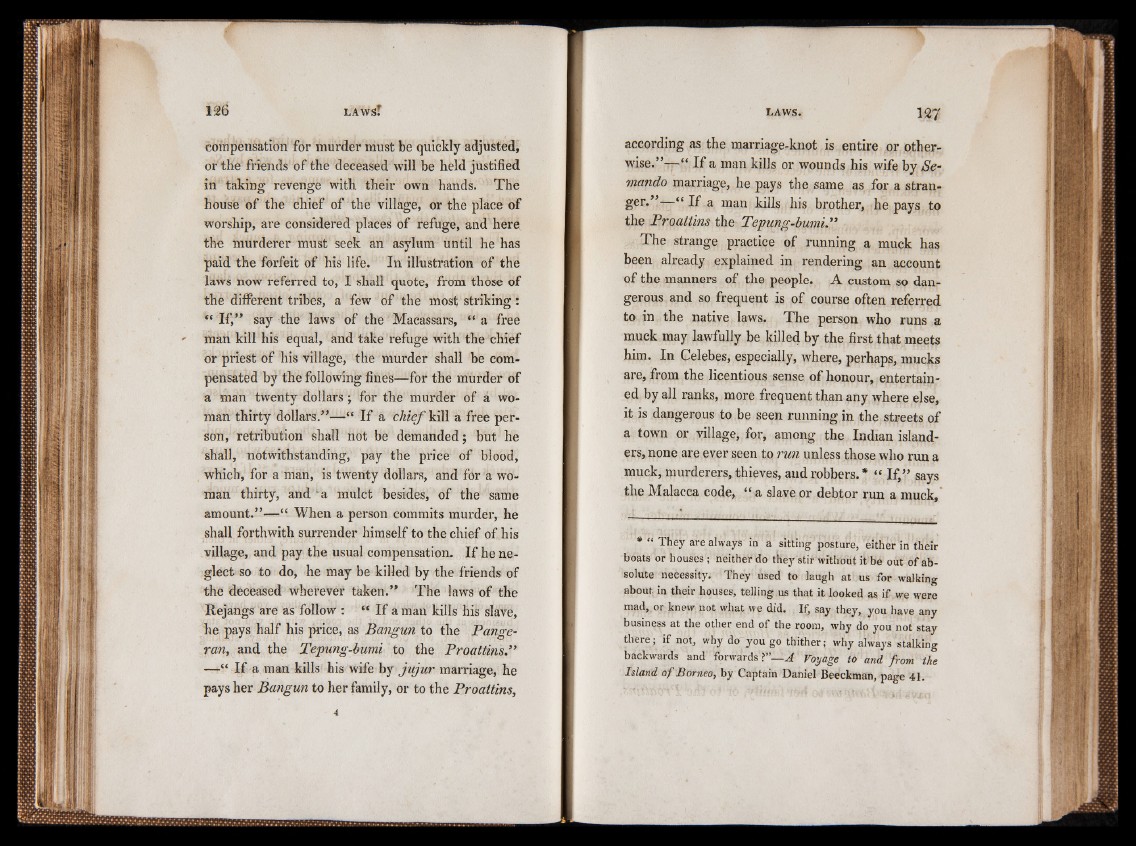
compensation for murder must be quickly adjusted,
or the friends of the deceased will be held justified
in taking revenge with their own hands. The
house of the chief of the village, or the place of
worship, are considered places of refuge, and here
the murderer must seek an asylum until he has
paid the forfeit of his life. In illustration of the
laws now referred to, I shall quote, from those of
the different tribes, a few of the most striking:
“ If,” say the laws of the Macassars, “ a free
man kill his equal, and take refuge with the chief
or priest of his village, the murder shall be compensated
by the following fines—for the murder of
a man twenty dollars; for the murder of a woman
thirty dollars.”—■“ If a chief kill a free person,
retribution shall not be demanded; but he
shall, notwithstanding, pay the price of blood,
which, for a man, is twenty dollars, and for a woman
thirty, and "a mulct besides, of the same
amount.”—“ When a person commits murder, he
shall forthwith surrender himself to the chief of his
village, and pay the usual compensation. If he neglect
so to do, he may be killed by the friends of
the deceased wherever taken.” The laws of the
Rejangs are as follow : “ If a man kills his slave,
he pays half his price, as Bangun to the Pange-
ran, and the Tepung-bumi to the Proattins.”
—“ If a man kills his wife by jujur marriage, he
pays her Bangun to her family, or to the Proattins,
according as the marriage-knot is entire or otherwise.”—“
If a man kills or wounds his wife by Se-
mando marriage, he pays the same as for a stran-
Ser’ “ If a man kills his brother, he pays to
the Proattins the Tepung-bumi.”
The strange practice of running a muck has
been already explained in rendering an account
of the manners of the people. A custom so dangerous
and so frequent is of course often referred
to in the native laws. The person who runs a
muck may lawfully be killed by the first that meets
him. In Celebes, especially, where, perhaps, mucks
are, from the licentious sense of honour, entertained
by all ranks, more frequent than any where else,
it is dangerous to be seen running in the streets of
a town or village, for, among the Indian islanders,
none are ever seen to run unless those who run a
muck, murderers, thieves, and robbers.* “ If,” says
the Malacca code, “ a slave or debtor run a muck,
* “ They are always in a sitting posture, either in their
boats or houses ; neither do they stir without it be out of absolute
necessity. They used to laugh at us for walking
about in then houses, telling us that it looked as if we were
mad, or knew not what we did. If, say they, you have any
business at the other end of the room, why do you not stay
there; if not, why do jou go thither; why always stalking
backwards and forwards V'—A Voyage to and from the
Island of Borneo, by Captain Daniel Beeckman, page 41.